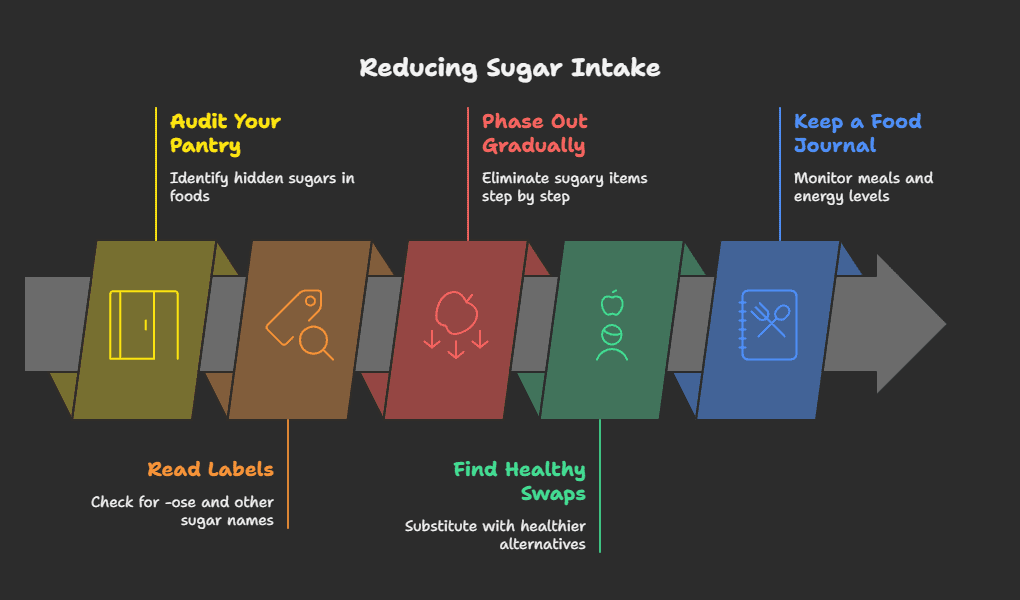“Sugar is sweet, but freedom from it is sweeter.”
Thinking about cutting out sugar? It might seem tough, especially since sugar pops up in sneaky places like pasta sauce and dressings. But here’s the good news: going sugar-free isn’t about missing out. It’s actually a path to feeling amazing. You’ll discover many benefits of a No Sugar Diet that can boost your health, lift your spirits, and even make you feel more confident. In this post, we’ll look at five surprising perks of saying goodbye to refined sugars and share easy tips to help you stick with it and enjoy the ride.
1. A Glowing, Healthy Complexion
One of the earliest things you’ll notice on a no-added-sugar diet is how your skin looks. Here’s why:
- Less Inflammation: Added sugars induce inflammation and fuel the bacteria that cause acne on your skin. By removing added sugars, you reduce markers of inflammation such as C-reactive protein (CRP), which dermatologists attribute to redness, swelling, and breakouts.
- Balanced Collagen Production: Excessive sugar consumption promotes glycation, a reaction in which sugar molecules attach to collagen strands, rendering skin less elastic and more susceptible to wrinkles. A no-sugar diet keeps collagen integrity intact, resulting in firmer, younger-looking skin.
- Hydration and pH Balance: Fruits and vegetables that take the place of sugary snacks tend to be high in water and nutritious elements like vitamin C and antioxidants. These promote skin hydration, even pH, and antioxidant protection from free radical damage.
Real-Life Story: Sarah, a 32-year-old marketing manager, struggled with adult-onset acne. After six weeks sugar-free, she reported a 60% reduction in breakouts and a clearer complexion, without changing her skincare routine.
Pro Tips for Glowing Skin on a No-Sugar Diet
- Hydrate Wisely: Target 2–3 liters of water per day; infuse with cucumber or mint to taste.
- Boost Antioxidants: Add berries, nuts, and green tea to combat oxidative stress.
- Gentle Exfoliation: Apply a weekly enzyme-based scrub to exfoliate dead skin cells.
2. Sustained Energy from Morning to Night
Do you find yourself crashing mid-afternoon, grabbing for a sugary snack or extra cup of coffee? Here’s how the no-sugar diet revolutionizes things:
- Stable Blood Sugar: Without the ups and downs of spikes and crashes, your body is able to keep a steady concentration of glucose, allowing muscles and organs to have consistent fuel.
- Improved Fat Adaptation: As the years pass, your cells get better at tapping into stored fat for energy, increasing endurance and less of those energy crashes.
- Regulated Hormones: Insulin sensitivity is enhanced, minimizing spikes in cortisol (the stress hormone) that cause you to feel jittery or drained.
Supporting Research: A 2023 study in the Journal of Nutritional Biochemistry found that participants on a low-sugar plan experienced 25% fewer energy crashes than those on a standard diet.
Practical Tips to Maintain Energy
- Protein Breakfast: Eat eggs, Greek yogurt, or a plant protein smoothie.
- Smart Snacks: Have nuts, hummus, and veggie sticks, or slices of cheese, handy.
- Regular Exercise: Short walks or stretch breaks every 60–90 minutes can increase circulation and alertness.
3. Clearer Focus, Sharper Mind
Brain fog, those times when focus is like swimming in molasses, is frequently related to diet. Below’s why eliminating sugar can improve your mental clarity:
- Neurotransmitter Balance: Fluctuating glucose changes levels of dopamine and serotonin, mood, and attention. Consistent sugar consumption maintains optimal neurotransmitter function.
- Less Oxidative Stress: Too much sugar produces free radicals that can destroy brain cells. Antioxidant-sufficient, sugar-free diets maximize neuroprotection.
- Better Sleep Quality: Diminished sugar intake tends to promote deeper, more restful sleep, critical for memory consolidation and learning.
Dietary Tips for a Brain-Friendly Diet
- Include Omega-3s: Fatty fish, flaxseeds, and walnuts nourish brain cell membranes.
- Complex Carbs: Quinoa, sweet potatoes, and legumes yield slow-release energy.
- Herbal Brain Boosters: Rosemary and ginkgo biloba are old-fashioned nootropics to try.
4. A Robust Immune Guard
- Did you know that sugar can take your immune system offline? The evidence is clear:
White Blood Cell Suppression: Excessive glucose reduces the function of neutrophils, your initial defense against infection, by as much as 50% for a few hours following sugar consumption. - Chronic Inflammation: Repeated sugar spikes induce systemic inflammation, making it more difficult for the immune system to fight legitimate threats.
- Gut-Immune Link: A diet rich in sugar promotes unhealthy gut bacteria, which can interfere with the gut-associated lymphoid tissue (GALT) that accounts for 70% of your immune system.
Study Highlight: In a 2022 trial, individuals who cut added sugars saw a 40% reduction in upper-respiratory infections over 12 weeks compared to those who didn’t change their diets.
Boost Your Defenses Naturally
- Stock Up on Vitamin C: Citrus fruits, bell peppers, and strawberries.
- Probiotic Power: Yogurt, kefir, and fermented veggies keep the gut in balance.
- Get Sufficient Sleep: 7–9 hours; lack of sleep compromises immunity.
5. Balanced Gut, Happier You
Your gut microbiome feeds on fiber and varied nutrients, not on refined sugars. This is what happens when you stay sugar-free:
- Microbial Diversity: Friendly bacteria such as Lactobacillus and Bifidobacteria thrive without sugar-driven overgrowth of pathogens.
- Improved Nutrient Absorption: A balanced gut lining absorbs vitamins and minerals better.
- Less Bloating: Sugar-free diets tend to include more whole foods, cutting down on FODMAP overload and stomach discomfort.
Feed Your Microbiome
- Fiber-Rich Foundations: Oats, chia seeds, and leafy greens.
- Probiotic Delights: Kimchi, sauerkraut, and kombucha (unsweetened).
- Polyphenol-Specific Foods: Dark chocolate (85 %+ cocoa), green tea, and olives.
Getting Started: Tips and Tricks

- Audit Your Pantry: Find hidden sugars in sauces, condiments, and packaged foods.
- Read Labels: Check for -ose (fructose, dextrose, maltose) and other names such as corn syrup or agave.
- Phase Out Gradually: Begin by eliminating beverages, then desserts, then condiments.
- Find Healthy Swaps: Substitute mashed banana or unsweetened applesauce in baking.
- Keep a Food Journal: Monitor meals, moods, and energy levels to identify patterns.
Common Challenges and How to Overcome Them {challenges}
| Challenge | Strategy |
|---|---|
| Sugar Cravings | Drink water, chew sugar-free gum, or snack on nuts and seeds. |
| Social Situations | Offer to bring a no-sugar dish or enjoy naturally sweet fruits |
| Cooking Adaptation | Experiment with spices like cinnamon, vanilla, and citrus zest. |
| Dining Out | Ask for sauces on the side and choose whole-food dishes. |
Meal Plan Sample: 7 Days of No-Sugar Inspiration {meal-plan}
| Day | Breakfast | Lunch | Dinner | Snack |
|---|---|---|---|---|
| Monday | Veggie omelet with spinach & tomato | Grilled chicken salad with olive oil | Baked salmon with asparagus | Apple slices with almond butter |
| Tuesday | Chia pudding with berries | Quinoa bowl with chickpeas & avocado | Turkey meatballs with zucchini noodles | Carrot sticks & hummus |
| Wednesday | Greek yogurt parfait w/o granola | Lentil soup & side salad | Stir-fry tofu with broccoli | Handful of walnuts |
| Thursday | Smoothie (spinach, banana, protein) | Tuna lettuce wrap | Beef stir-fry with peppers | Celery with peanut butter |
| Friday | Scrambled eggs & sautéed kale | Cauliflower rice burrito bowl | Grilled shrimp & mixed veggies | Olives & cheese cubes |
| Saturday | Avocado toast on sprouted bread | Tomato soup & grilled chicken slices | With roasted carrotsPork tenderloin | carrotsPork tenderloin w Dark chocolate (85 %+) |
| Sunday | Pancakes (almond flour, banana) | Buddha bowl w/ sweet potato & beans | Eggplant parmesan (no breadcrumbs) | Berry mix |








